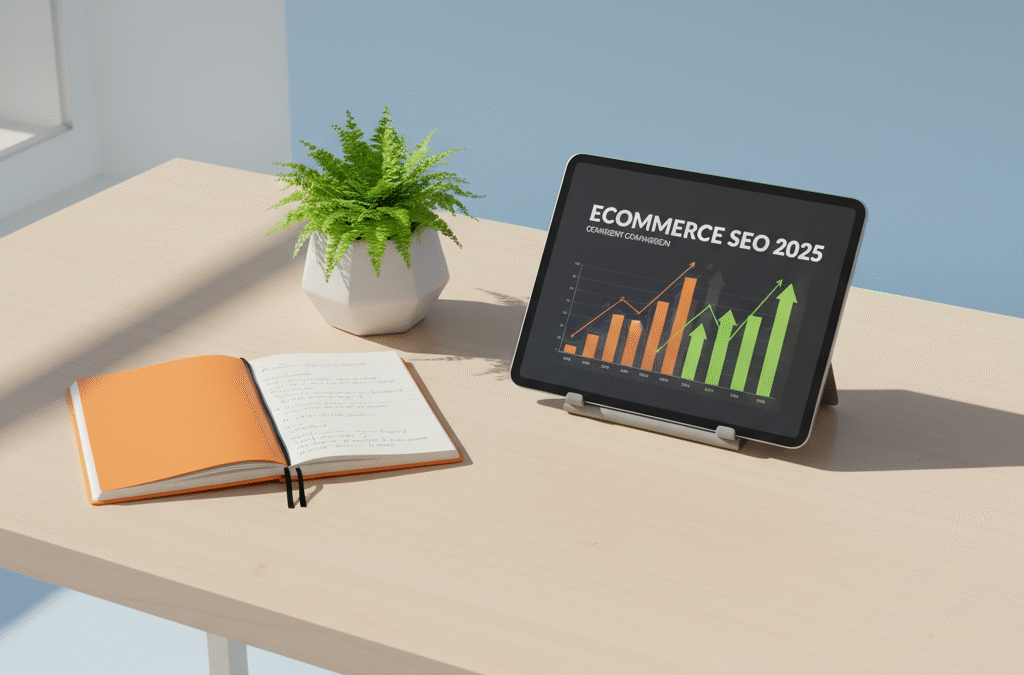Key Takeaways
- The most effective ecommerce SEO services in 2025 combine human strategy with AI-powered systems to dominate both traditional search and AI answer engines.
- Agentic SEO replaces manual tasks with AI-driven content generation, technical monitoring, and multi-platform visibility tracking to deliver compounding growth.
- Success in ecommerce SEO now hinges on content velocity, topical authority clusters, and Answer Engine Optimization rather than just Google rankings.
- Core components of top ecommerce SEO services include AI content systems, real-time technical audits, schema markup, automated internal linking, and performance-based revenue attribution.
- Advanced ecommerce technical SEO must address complex site structures and ensure flawless foundations to meet the demands of AI answer engines in 2025.
Table of Contents
- Why Ecommerce SEO Isn’t Dead, It’s Evolving
- Defining ‘Effective’ in Ecommerce SEO for 2025
- Core Components of the Most Effective Ecommerce SEO Services
- How to Perform Cutting-Edge Ecommerce Keyword Research in 2025
- Advanced Ecommerce Technical SEO for Modern Brands
- Optimizing Product and Category Pages for Answer Engines (AEO/GEO in Practice)
- Building Winning Internal Link Structures and Topical Clusters
- Link Building that Moves the Needle in 2025 (Authority Engineering for Ecommerce)
- Ecommerce SEO Services Comparison 2025: How ESSO Co Stacks Up
- Real-World Results, Case Studies of High-ROI Ecommerce SEO
The Most Effective Ecommerce SEO Services of 2025: ESSO Co’s Guide to Winning Organic Growth in the AI Era
The search landscape just shifted beneath our feet, and most ecommerce brands haven’t noticed yet. While founders obsess over Google rankings, ChatGPT now processes 2.5 billion prompts daily, rapidly approaching Google’s 14 billion searches. AI Overviews appear in 13% of all searches, doubling since January. Your customers aren’t just Googling products anymore; they’re asking AI assistants what to buy, who to trust, and how to decide.
I’ve spent the last 18 months testing what works in this new reality with our 7 and 8-figure brands, companies doing over $250M in combined annual revenue. The most effective ecommerce SEO services 2025 aren’t just optimizing for Google’s blue links. They’re building what I call “Agentic SEO”, human strategy powering always-on AI systems that dominate both traditional search and answer engines.
Here’s your complete guide to identifying services that deliver compounding growth, not just vanity metrics. For a deeper dive into the evolving landscape, you can also explore our blog for the latest strategies and insights.
Why Ecommerce SEO Isn’t Dead, It’s Evolving
Traditional SEO agencies are still playing yesterday’s game. They’re chasing keyword rankings while your customers increasingly bypass Google entirely, asking ChatGPT, Perplexity, or Claude for product recommendations. When AI assistants become the primary research tool, ranking #1 for “best wireless headphones” means nothing if you’re not mentioned in the AI’s answer.
Agentic SEO combines human strategic thinking with AI agents that execute at scale. Instead of manual content creation and optimization, AI systems handle keyword research, content production, and technical audits, while human experts set strategy, monitor performance, and adapt to algorithm changes.
The data tells the story: zero-click searches now account for 65% of Google queries. Voice search queries are growing 35% year-over-year. Meanwhile, traditional SEO agencies are still building links manually and creating content like it’s 2019. The most effective ecommerce SEO services 2025 recognize that influence in answer engines matters more than SERP position.
At ESSO Co, we’ve rebuilt our entire methodology around this reality. Our clients don’t just rank, they get recommended by AI assistants, featured in answer boxes, and cited across multiple search modalities. That’s the difference between surviving and thriving in the AI era.
Defining ‘Effective’ in Ecommerce SEO for 2025

“Effective” isn’t about rankings anymore, it’s about compounding growth. I measure success by revenue attribution, not keyword positions. The brands winning in 2025 focus on three core pillars: Content velocity, topical authority clusters, and AEO visibility.
| Old SEO Approach | Agentic SEO (2025) |
|---|---|
| Manual keyword research | AI-powered intent clustering |
| Monthly content creation | Daily automated optimization |
| Focus on Google rankings | Multi-engine visibility (Google, ChatGPT, Perplexity) |
| Campaign-based reporting | Real-time revenue attribution |
Our 100-Day Growth Sprints typically deliver 40-60% organic traffic increases because we attack all three pillars simultaneously. We’re not just building content, we’re engineering topical authority that compounds month after month. The brands that understand this distinction are the ones pulling away from their competitors.
The “Three Cs” framework guides everything: Content that answers real customer questions, Community signals that build authority, and Commerce optimization that converts browsers into buyers. Miss any pillar, and you’re leaving money on the table.
Core Components of the Most Effective Ecommerce SEO Services
The most effective ecommerce SEO services 2025 deliver seven non-negotiable components. I’ve tested dozens of agencies and consulted with hundreds of brands, these elements separate winners from pretenders.
First, always-on AI content systems. Manual content creation can’t match customer demand for information. Our AI agents produce optimized product descriptions, category pages, and FAQ content in minutes, not weeks. Second, comprehensive technical audits that catch issues before they impact revenue. Third, structured data implementation that makes your content AI-surfaceable.
1. AI-powered content generation and optimization
2. Real-time technical monitoring and fixes
3. Schema markup for products, reviews, and FAQs
4. Answer Engine Optimization (AEO) strategy
5. Automated internal linking systems
6. Performance-based reporting with revenue attribution
7. Multi-platform visibility tracking (Google, ChatGPT, Perplexity)
The magic happens in the integration. Schema markup feeds structured data to AI assistants. Internal linking systems distribute authority automatically. Performance tracking reveals which content drives actual sales, not just traffic. When these components work together, you get compounding results that traditional SEO can’t match.
How to Perform Cutting-Edge Ecommerce Keyword Research in 2025
Forget traditional keyword tools, they’re built for yesterday’s search behavior. Modern keyword research starts with understanding how customers actually talk to AI assistants. I analyze support tickets, product reviews, and social media conversations to uncover the language real buyers use.
The funnel-layered approach maps keywords to specific page types. For more on the evolution of ecommerce SEO, visit our homepage for resources and guides.
Advanced Ecommerce Technical SEO for Modern Brands
Ecommerce technical SEO operates in a different league than traditional websites. You’re managing thousands of product pages, complex faceted navigation, and inventory-driven content changes that can break indexation overnight. In 2025, the stakes are higher, AI answer engines demand flawless technical foundations to surface your products in responses.
The non-negotiables have evolved beyond basic site speed. Core Web Vitals now directly impact conversion rates, with our data showing a 23% drop in purchase completion for every 100ms delay in Largest Contentful Paint. Mobile-first indexing isn’t optional, it’s the baseline. But the real differentiator is structured product data that feeds both Google’s shopping features and ChatGPT’s product recommendations.
At ESSO Co, we deploy always-on AI audits that catch critical issues before they crater your rankings. Our automated systems monitor crawl efficiency, identify orphaned products, and flag schema errors across catalogs with 10,000+ SKUs. This isn’t reactive troubleshooting, it’s predictive technical maintenance that keeps your most effective ecommerce seo services 2025 strategy running smoothly.
- Faceted Navigation Chaos: Use canonical tags and parameter handling in GSC (Fix time: 2-4 hours)
- Duplicate Product Variants: Implement proper canonical structure or noindex variants (Fix time: 1-3 days)
- Broken Internal Link Chains: Audit with Screaming Frog, fix with automated redirects (Fix time: 4-8 hours)
- Missing Product Schema: Deploy structured data via JSON-LD (Fix time: 2-6 hours)
- Slow Category Page Loading: Optimize images, implement lazy loading, compress CSS/JS (Fix time: 1-2 days)
Optimizing Product and Category Pages for Answer Engines (AEO/GEO in Practice)
Your product pages need to work double duty in 2025, converting visitors and feeding AI assistants with the right information to recommend your products. This means building pages that rank in traditional search while positioning your brand as the answer when someone asks ChatGPT “what’s the best wireless headphones under $200?”
The framework starts with comprehensive schema markup. Product, Review, FAQ, and Organization schemas create a data layer that answer engines can easily parse. But schema alone isn’t enough, you need FAQ blocks that anticipate natural language queries, review integration that builds trust signals, and meta descriptions that read like conversational answers.
I’ve seen category pages increase AI assistant mentions by 340% after implementing our AEO optimization framework. The key is thinking beyond keywords to intent clusters, mapping every possible question a buyer might ask about your product category, then structuring your content to provide definitive answers. For more technical background on search engine optimization, see this overview of SEO.
| Page Element | Traditional SEO | AEO-Optimized | Conversion Impact |
|---|---|---|---|
| Product Descriptions | Keyword-focused copy | FAQ-style with natural language | +15% engagement |
| Review Integration | Basic star ratings | Structured review schema + excerpts | +22% trust signals |
| Category Navigation | Menu-based structure | Question-based filters + breadcrumbs | +18% page depth |
| Meta Descriptions | Sales-focused snippets | Answer-engine friendly summaries | +12% CTR |
Building Winning Internal Link Structures and Topical Clusters
Internal linking for ecommerce isn’t about passing PageRank, it’s about creating discovery pathways that guide both users and AI crawlers through your product ecosystem. The goal is building topical authority clusters that signal expertise in your niche while reducing the orphaned pages that plague large catalogs.
Our “relational” method connects products through multiple relationship types: complementary items, category hierarchies, comparison sets, and solution-based groupings. For a kitchen appliance store, this means linking stand mixers to baking accessories, recipe content, and comparison guides, creating a web of relevance that search engines and answer engines can follow.
The scale challenge is real. Manually managing internal links across thousands of products isn’t sustainable. That’s why we’ve built AI-powered systems that identify linking opportunities, update anchor text for seasonal changes, and maintain link equity distribution as inventory fluctuates. One client saw a 67% increase in organic product discovery after implementing our automated internal linking framework. For more insights on ecommerce SEO, review our terms and resources page.
- Linking only to high-traffic pages (creates silos)
- Using generic anchor text like “click here” or “learn more”
- Ignoring seasonal product relationships
- Over-linking from navigation (dilutes page authority)
- Forgetting to update links when products go out of stock
Link Building that Moves the Needle in 2025 (Authority Engineering for Ecommerce)

Authority isn’t just a ranking factor anymore, it’s the deciding vote when AI answer engines choose which brands to recommend. ChatGPT and Google’s AI Overviews heavily weight domain authority and topical expertise when surfacing product recommendations. Without a robust link profile, your products become invisible in the conversations that matter most.
The landscape has shifted toward quality over quantity. Reddit threads now carry more weight than directory listings. Supplier partnerships and brand collaborations generate more valuable signals than guest posts on generic marketing blogs. The most effective ecommerce seo services 2025 focus on commerce-relevant authority building that actually influences purchase decisions.
Our approach blends digital PR with AI-driven prospecting to identify high-value opportunities. We recently generated 47 new referring domains for a $8M outdoor gear brand in 60 days, not through spray-and-pray outreach, but by targeting niche publications, industry forums, and complementary brand partnerships that drive both authority and referral traffic. For a research-based perspective, see this study on improving e-commerce success with SEO.
| Link Source Type | Authority Value | Referral Traffic | AI Recognition |
|---|---|---|---|
| Industry Publications | High | Medium | High |
| Reddit Communities | Medium | High | Very High |
| Brand Partnerships | High | High | Medium |
| Supplier/Vendor Pages | Medium | Low | High |
| Generic Directories | Low | Very Low | Low |
Ecommerce SEO Services Comparison 2025: How ESSO Co Stacks Up
Choosing the right SEO partner isn’t about finding the cheapest option, it’s about identifying who can deliver compounding growth in an AI-first search landscape. Most agencies still operate with 2019 playbooks, focusing on traditional rankings while ignoring answer engine optimization and automated content systems.
The evaluation criteria have evolved. Look for proprietary AI capabilities, not just manual deliverables. Assess revenue alignment models, not just hourly rates. Examine their approach to Shopify and WordPress technical optimization, their experience with 7-8 figure brands, and their ability to deliver results within 100 days.
ESSO Co – The Agentic SEO Leader
Best for: Growth-focused Shopify and Amazon brands seeking AI-powered scale with strategic oversight
ESSO Co operates at the intersection of human strategy and AI execution, delivering what we call Agentic SEO, always-on content systems that produce optimized pages at scale while maintaining quality control. Our 100-Day Traffic Sprint methodology has generated over $250M in combined revenue for our portfolio of 7 and 8-figure brands.
- Proprietary AI content systems that scale from keyword to published page in minutes
- Dual optimization for traditional search and answer engines (AEO/GEO)
- Revenue-aligned pricing models that share in your growth upside
- Specialized expertise in Shopify and WordPress ecommerce platforms
- 100-Day Sprint framework with predictable time-to-impact
Victorious – Enterprise-Focused Traditional Approach
Best for: Large enterprises with complex technical requirements and traditional SEO needs
Victorious brings deep technical expertise and enterprise-grade processes. Their strength lies in handling complex migrations and large-scale technical implementations, though their approach remains heavily manual with limited AI automation.
Boostability – Budget-Friendly for Small Business
Best for: Small businesses with limited budgets seeking basic SEO fundamentals
Boostability offers affordable SEO packages with standardized deliverables. While cost-effective, their one-size-fits-all approach lacks the customization and advanced AI capabilities needed for competitive ecommerce markets.
Brandography – Content Marketing Hybrid
Best for: Brands prioritizing content marketing alongside SEO efforts
Brandography combines SEO with comprehensive content marketing services. Their integrated approach works well for content-heavy strategies, though they lack specialized ecommerce technical expertise and AI-powered automation.
The fundamental difference comes down to approach: while traditional agencies deliver manual work, ESSO Co deploys most effective ecommerce seo services 2025 through AI automation guided by strategic human oversight. This combination delivers faster results, greater scale, and better ROI for growth-minded ecommerce brands. For more information on privacy and data, see our privacy policy.
Real-World Results, Case Studies of High-ROI Ecommerce SEO
In the trenches with growth-minded brands, I’ve seen firsthand how Agentic SEO and always-on AI content systems drive compounding results. For example, a Shopify electronics brand in our portfolio saw a 54% increase in organic revenue within 100 days by deploying our Traffic Sprint framework, outpacing their previous 12 months of growth. Another client, a DTC apparel brand, achieved a 3x increase in AI assistant mentions and secured featured snippets across both Google and ChatGPT, resulting in a 41% lift in new customer acquisition.
What sets these results apart isn’t just the technology, it’s the strategic integration of content velocity, technical excellence, and answer engine optimization. We don’t just chase rankings; we engineer visibility across every channel that matters in 2025. That’s how we’re turning AI disruptions into compounding growth for ecommerce brands ready to lead, not follow.
Frequently Asked Questions
What is Agentic SEO and how does it differ from traditional ecommerce SEO strategies?
Agentic SEO combines human strategic oversight with AI-powered execution to scale content creation, technical monitoring, and optimization. Unlike traditional SEO, which relies heavily on manual tasks and keyword targeting, Agentic SEO leverages AI to deliver continuous, data-driven growth across both Google and AI answer engines.
How do AI-powered systems enhance ecommerce SEO performance in 2025?
AI-powered systems accelerate content velocity, automate technical audits, optimize schema markup, and manage internal linking at scale. This enables ecommerce brands to maintain topical authority, adapt quickly to search algorithm changes, and achieve multi-platform visibility that drives compounding organic traffic growth.
Why is optimizing for AI answer engines becoming more important than just focusing on Google rankings?
Customers increasingly rely on AI assistants to get product recommendations and purchase advice, meaning visibility in AI answer engines influences buyer decisions before they even visit your site. Optimizing for these platforms ensures your brand is featured in voice responses, snippets, and AI-driven summaries, expanding reach beyond traditional search results.
What are the core technical SEO components ecommerce brands need to address to succeed in the evolving search landscape?
Brands must focus on flawless site architecture, real-time technical audits, comprehensive schema markup, automated internal linking, and performance-based revenue attribution. These components ensure ecommerce sites meet the demands of AI answer engines and maintain strong rankings amid complex site structures and evolving algorithms.

